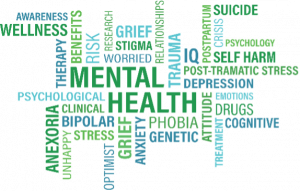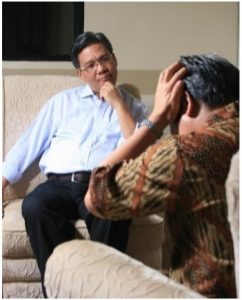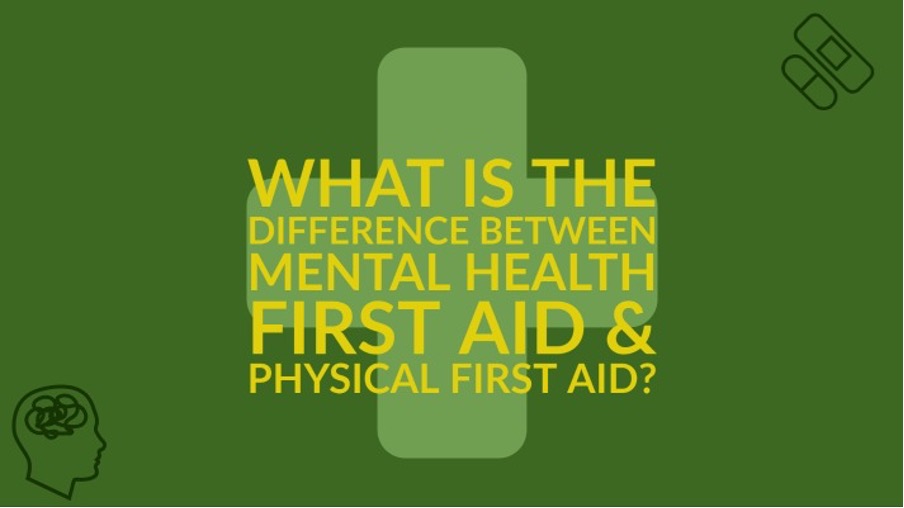What is the difference between Mental Health First Aid and physical first aid? What are the similarities between these two crucial skills? Why do workplaces need Mental Health First Aiders?
Nazia Chowdhury, our Social Media, Marketing & PR intern, explains all in this short blog…
What is the difference between Mental Health First Aid and Physical First Aid?
Many people are not aware of the differences between Mental Health First Aid (MHFA) and Physical First Aid…and some people do not understand what Mental Health First Aid is. This blog post aims to provide clarity and build awareness around this, and also explains why MHFA is important in the workplace. You can also find out how to become a Mental Health First Aider with Pathlight…
What is Physical First Aid?
Physical First Aid refers to the immediate medical care given to an individual that is suffering a physical illness or injury. Physical first aid involves offering assistance to help preserve life, prevent further harm, provide comfort and promote recovery.
Physical First Aiders gain crucial life skills, confidence and knowledge on how to maintain the physical health of other individuals.

What is Mental Health First Aid?
Mental Health First Aid, also referred to as MHFA, is the mental health equivalent of physical first aid and is concerned with maintaining the mental health of an individual.
MHFA refers to the support given to an individual experiencing a mental health issue. This includes issues such as, depression, anxiety, suicidal thoughts, self-harm, eating disorders, bipolar disorder and more. However, Mental Health First Aid also takes into account the physical health of an individual.
“Mental illness is the second-largest source of burden of disease in England. Mental illnesses are more common, long-lasting, and impactful than other health conditions.”
~ Public Health England
MHFA involves providing assistance through quality communication to help respond to and reassure an individual affected by mental health issues. Similar to physical First Aid, MHFA is often the very first intervention before professional help is received. MHFA may be applied in a crisis situation or a mental health issue is just beginning to develop.

Mental Health First Aid courses provide delegates with crucial life skills, giving them the confidence, skills and knowledge to spot the signs of mental health issues, preserve a life, support the recovery of positive mental health and provide comfort to those affected by mental health issues. Through active listening and non-judgemental communication Mental Health First Aiders can confidently approach and support family, friends and colleagues, whether that be in a crisis situation or to prevent a crisis from happening.
Like Physical First Aiders, Mental Health First Aiders can learn to signpost individuals to appropriate professional help and other forms of support, provide information, reassurance and hope, all of which can empower recovery. Mental Health First Aiders are also provided with tools to fight the societal stigma and discrimination that surrounds mental ill health, raising awareness of mental health issues and, further empowering recovery.
Why is MHFA important in the workplace?
“Mental ill health is responsible for 72 million working days lost and costs UK employers £34.9 billion each year.”
~ Centre for Mental Health
The pressures from our daily lives can be stressful and may negatively impact our mental health. In the workplace this can be manifest as employee absenteeism, presenteeism, staff turnover, reduced levels of motivation and productivity and more. By understanding how the workplace can affect mental health and providing a more open, inclusive and compassionate corporate culture, employers can significantly reduce costs and boost productivity.

Mental Health First Aiders are just as important in the workplace as physical First Aiders. The majority of us do not know how to respond to someone who may be experiencing a mental health issue. Mental Health First Aiders in the workplace can monitor employee behaviour and spot signs and symptoms of mental ill health early. Early intervention is crucial to recovery and can prevent a crisis from happening. Qualified Mental Health First Aiders can provide effective support, encourage a healthy, fuller life, increase life quality, promote recovery and self-care techniques to maintain positive wellbeing.
Mental Health First Aiders can also support the implementation of positive workplace practices and workplace wellbeing. Mental health issues are very common, but many people are not well-informed around mental health and mental ill health. As individuals, we may lack the insight to realise that we need help or that help is available. Professional help is not always on hand and this is where Mental Health First Aiders can step in, while raising awareness and reducing stigma and discrimination.
How to become a Mental Health First Aider
Pathlight offer a range of Mental Health First Aid courses for organisations and individuals that wish to support adults experiencing mental health issues in their workplace or personal life. Our courses can provide you with in-depth knowledge, awareness and confidence to support your own and others mental health and wellbeing.
Pathlight offer the following Mental Health First Aid courses for adults aged 16+:
- Two-Day Mental Health First Aider
- One-Day Mental Health Champion
- Half-Day Mental Health First Aid Aware
To find out which course is right for you visit our website or contact us:
https://www.pathlight.org.uk/mental-health-first-aid-training/
Further information and support…
- Click here to sign up to Pathlight’s e-newsletter for occasional updates on our services, resources to support mental health & wellbeing and more.
- Visit our website or email us for details of our services
-
- Mental Health First Aid training
- Workplace wellbeing programmes
- Coaching for individuals, families and teams
- Webinars for individuals and organisations



For more information on this blog post, interviews or services provided by Pathlight Ltd, please email Paul: info@pathlight.org.uk


